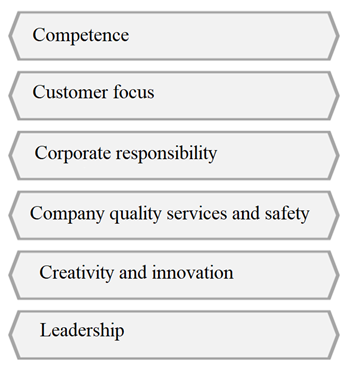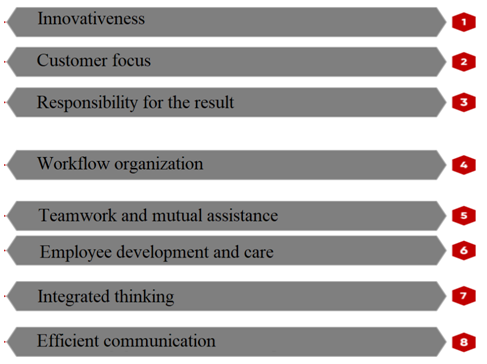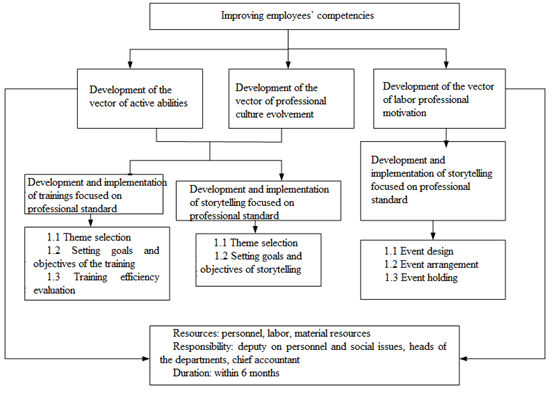Competency-Based Approach To Internal Corporate Social Responsibility Implementation In Russian Railways
Abstract
In this paper the analysis of the mechanism for the internal corporate responsibility implementation in Russian Railways is held using the competency-based approach that allows detailing key competencies to job indicators at each level of the management hierarchy. The key competence of this mechanism in the updated since 2019 corporate competency model of Russian Railways is identified. The practical implementation of internal corporate responsibility management is considered on the example of the structural subdivision of Russian Railways. The analysis of the level of ‘employee development and care’ competence among the employees in the distance of power supply is performed on the basis of staff survey and organization’s performance indicators dynamic monitoring. The respondents group for the staff survey included representatives of various personnel categories. Three activities to correct the ‘employee development and care’ competence are proposed, comprehensive activities implementation program and its schedule are developed, resources for its implementation are identified, and social effect for the proposed activities implementation is evaluated. It is shown that proposed measures will have impact on the level of employees’ satisfaction with labour process, quality of their work and their competency.
Keywords: Corporate social responsibility to personnelcompetency-based approachrailway transportpersonnel management
Introduction
The issues related to social and labor relations are of great importance under the rapid development of a technocratic society as is demonstrated by many publications on this subject ( Melnikova, 2019; Witchalls, 2019; Yarkova et al., 2018). In this respect a very significant contribution is made by employing organizations that apply various tools to regulate their activities within the framework of external and internal responsibility both to the society and to their employees ( Arzenšek et al., 2018; Turoń, 2017). Therefore, in the present state of the art the socio-economic development of organizations must meet the requirements of not only business, but of the society and staff as well ( Ratusheva, 2018; Tubelis, 2019).
Due to the fact that Russia occupies a vast territory and possesses immense deposits of natural resources, the role of railway transport in the country’s economy is crucial – Russian Railways carries out about 88% of freight traffic. The company employs more than 700,000 employees, which is 0.85% of the total working population of the Russian Federation. Thus, the issues of human resources management and personnel development in Russian Railways are in the public eye nowadays.
Problem Statement
JSC Russian Railways in its activities is focused not only on the implementation of external corporate social responsibility, but also on the internal one ( Petukhov & Gorshkov, 2019; Samusev & Kalinova, 2018). The competency-based approach implemented in JSC Russian Railways allows promoting the corporate values of the company from the mission to the levels of posts, job competencies, sub-competencies and their indicators implemented in the personnel management system through this model ( Kolbasova & Kutuzova, 2017; Malakhova, 2016). Competency indicators are used in the personnel selection, motivation, assessment, certification, training in JSC Russian Railways ( Kutepova, 2018; Matsas et al., 2019; Staver & Yakimova, 2017). Considering the updated model of corporate competencies of JSC Russian Railways defined in the ‘Regulation on the model of corporate competencies in JSC Russian Railways’ approved by the decision of the Board of JSC Russian Railways dated May 13, 2019 No. 25, one might note an increase in the emphasis on internal corporate social responsibility (see Figure


In particular, the corporate competence ‘employee development and care’ is of interest in the present study. This major competence implies reinforcement of three subcompetences – ‘developmental management’, ‘talents recruitment and promotion’, and ‘developmental ability’.
In accordance with the management objective laws, the success of any management system, including internal social responsibility, implies the presence of feedback at the lower level of management for making optimal management decisions. Thus it is necessary to develop a practical implementation of this mechanism.
Research Questions
The analysis of building up the ‘employee development and care’ competence and its assessment have been performed on the example of the distance of power supply – a structural subdivision of Russian Railways. The main objective of the distance is to ensure the stable and safe operation of power supply devices, the complete satisfaction of railway consumers with electricity for the planned amount of work, with the unconditional observance of safety and labor protection rules. The distance serves such power supply devices as traction substations, a contact network, DPR, signaling, transformer substations, overhead and cable lines 10 kV and 0.4 kV, which are on the balance of the distance. The deployed length of the serviced contact suspension is 1305.68 km.
In regard to the distance personnel structure 56% are workers, 7% are managers of the total 329 employees. Share of specialists with higher education is 46.7% in the distance. The percentage of men working in the distance reaches 86% due to labor specifics. The age category up to 35 years is dominating (43.5% of the total number of employees). About 39% of employees have been working at the enterprise for more than 10 years. The staff turnover rate is close to natural and is equal to 4.5%.
The main goals of continuous professional education of managers and specialists are the study and implementation of new scientific, technical, organizational and economic ideas, the acquisition and development of professional knowledge and skills by managers and specialists, the training of staff reserve, and the adaptation of managers and specialists to new economic and social conditions. In addition to training related to main production process, managers and specialists attend additional training programs covering safety and labor protection rules, lean manufacturing, traffic safety and highly specialized skills.
Purpose of the Study
The aim of this paper is to formulate recommendations for building up the ‘employee development and care’ competence in the distance of power supply as an element of the mechanism for internal corporate responsibility implementation.
Research Methods
In the framework of the present study a survey of employees was performed, the purpose of which was to find out the respondents’ opinion about the problems in the area of subcompetences, namely related to ‘developmental management’, ‘talents recruitment and promotion’, and ‘developmental ability’. For this purpose, a questionnaire consisting of 23 questions was developed. The number of respondents amounted to 50 persons (15.2% of the total number of staff), including 4 managers, 38 employees and 8 workers.
Findings
As a result of processing the obtained results the problems of building up ‘employee development and care’ competence have been identified, namely the lack of activity abilities, professional culture and motivation. To improve the competence mentioned above the following measures have been proposed as shown in Table
It is supposed that the ‘Improving professional competence under professional standards requirements’ training course for electricians, electricians and senior electricians will be conducive to emotional environment stabilization, professional competence fostering, professionally significant personality traits and skills of self-actualization and reflection development, building up a position of a successful employee, identifying leaders.
Training is an active learning method aimed at developing knowledge, skills and social attitudes. It represents a form of interactive learning, the purpose of which is to develop the competence of interpersonal and professional behavior in communication.
Storytelling is the narrative of various myths, tales, parables or epics. It is considered to be an effective method of conveying information to an audience by telling a story with real or imagined characters. Storytelling is used to develop production culture, to transfer life experience, to train new employees, to foster the brand of a valuable leader, to improve customer attitude to the organization, to reinforce corporate values and communication. Storytelling is applicable as the form of a marketing method, in business, in psychotherapy, in the form of marketing techniques.
Storytelling includes signs that many electricians have. If it rains and thunderstorms, the light will turn off: by all means the lightning in the line will die, and the water of the insulators with the poppy head will flood. There can be no light in the wind: from a storm, how to drink, let it flow together. Snow and ice are doom to the light: from their gravity the wires will break, and the supports will fall. Do not wait for light in the heat and calmness: from the sun, the upper wires stretch out and lie exactly on the lower ones, since the wind does not hesitate. There are also stories on seasons of the year. Spring is the end of light, the earth is playing, the cable is breaking. Summer: is it burning anywhere? If the pillar is on fire, there is no light in the window. Autumn will drop the wire to the ground, wait with the wind and rain without light.

Winter is without light at home: the load grows, it burns where it is narrow. Storytelling is applicable when adapting to corporate ideology, training employees using descriptions of successful and unsuccessful examples in work (there is an exchange of skills and experience between employees, the number of repetitions of old mistakes is reduced, and the stress of new employees is leveled in case of failures); while monitoring the attitude of employees to the mistakes of managers and problematic situations that the company periodically encounters; while increasing the effectiveness of communications at different levels, including the ones between managers and subordinates.
To implement the development of the vector of professional motivation, it is necessary to introduce a grant system based on professional standards. The purpose of the grant system is to identify and encourage the best worker in the distance for his high professionalism and for compliance with a professional standard. Awarding the ‘Employee of the Year’ nomination is to be held on December, 26 of each year, the assessment is performed from July, 1 to December, 1. At the level of an enterprise the commission establishes applicants and organizes the internal selection of candidates. In the process of production activities the commission evaluates the results of the applicants in accordance with the specified criteria. The working commission provides open informational support for the event: the intermediate and final indicators of the applicants are announced at the labour meetings of the team. The final assessment of the finalist of the competition is set by the commission as the amount of grants. The employee who received the ‘Employee of the Year’ title is awarded a subscription for the whole family to the pool, a day off at the expense of the enterprise on any day and an honorary diploma.
The executors of the event will be:
deputy on personnel and social issues, who will monitor the progress of the implementation of the planned activities;
heads of the departments who will directly carry out activities to achieve the established objectives;
chief accountant who will seek free cash to finance innovative projects.
The proposed strategy is expected to be implemented within 6 months.
Evaluation of the effectiveness of the proposed program consists in determining the degree of achievement of the goals of the program, formalized as target values of performance indicators. The evaluation results provide the program manager with information for making operational management decisions.
Conclusion
Thus, there is a strong likelihood that the proposed measures for building up ‘employee development and care’ competence will have social impact on the level of employees’ interest, quality of their work, satisfaction with activities and their competency. It is assumed that the development and implementation of training courses focused on the development and care of employees will be conducive to evolving skills for solving standard and non-standard tasks with the help of professional knowledge, for accumulation and implementation of new knowledge into the labour process. It seems highly likely that the development and implementation of storytelling focused on personnel development and care for employees will foster professional cultural values, professional norms and principles of socially responsible behaviour, communication style, and employees’ value priorities. Arranging the ‘Employee of the Year’ contest on a regular basis in its turn will contribute to increasing the motivation level in the field of the employee’s attitude towards the accumulation of new knowledge, readiness for effective work, training, professionally collective and professionally personal development.
Considering the foregoing, the external corporate social responsibility of the distance, a structural subdivision of Russian Railways, in the provision of high-quality services for the maintenance of power supply devices for the serviced railway section will also be realized to a greater extent.
References
- Arzenšek, A., & Franca, V., & Laporšek, S. (2018). Corporate Social Responsibility Towards Employees. Proc. Int. Conf. on Management International Conference MIC 2018, Bled, Slovenia, 30 May – 2 https://www.researchgate.net/publication/332329338_Corporate_Social_Responsibility_Towards_Employees_-Analysis_of_Slovenian_and_Foreign_Good_Practices
- Kolbasova, A. O., & Kutuzova, A. V. (2017). Ocenka professionalnyh kompetencij personala [Assessment of professional competencies of personnel] Actual problems of aviation and astronautics, 3(13), 798-800. [in Rus.]
- Kutepova, I. V. (2018). Vliyanie socialnoj otvetstvennosti organizacii na motivaciyu sotrudnikov [Influence of social responsibility of the organization on motivation of employees]. Proc. Int. Conf. on Human Resource Management: Theory, Practice, and Prospects. ‘International Youth Scientific and Practical Conference’, 224-228. [in Rus.]
- Malakhova, A. A. (2016). Ocenka personala organizacii na osnove kompetentnostnogo podhoda [Assessment of the organization’s personnel based on the competency-based approach] Socio-economic and humanitarian journal of the Krasnoyarsk State Agrarian University, 4(4), 90-103. [in Rus.]
- Matsas, A. A., Yakimova, L. D., & Yarkova, S. A. (2019). Organizaciya raboty personala v usloviyah cifrovizacii ekonomiki [Organization of the work of personnel under the digitalization of the economy] Proc. Conf. on Digitalization of Transport and Education. ‘All-Russian Scientific and Practical Conference dedicated to the 125th anniversary of railway education in Siberia’ Krasnoyarsk, October 9-11, 2019, 278-286. [in Rus.]
- Melnikova, E. V. (2019). Upravlencheskie innovacii I process didzhitalizacii: logika vzaimosvyazi [Managerial innovations and digitalization processes: the logic of interconnection] Economics and Management: modern challenges, trends and development prospects. Materials of the XXIII International Scientific and Practical Conference, 246-251. [in Rus.]
- Petukhov, A. V., & Gorshkov A. S. (2019). Osobennosti realizacii korporativnoj socialnoj otvetstvennosti v sfere zheleznodorozhnyh perevozok Rossii [Features of implementation of corporate social responsibility in the field of railway transportation of Russia]. Bulletin of the Moscow Humanitarian and Economic Institute, 3, 105-118. [in Rus.]
- Ratusheva, A. V. (2018). Korporativnaya socialnaya otvetstvennost kak factor socialno-ekonomicheskogo razvitiya [Corporate social responsibility as a factor of social and economic development]. Proc. Int. Conf. on Analysis, modeling, management, development of socio-economic systems. ‘XII International School-Symposium AMUR-2018’, 398-400. [in Rus.]
- Samusev, N. S., & Kalinova, A. A. (2018). Socialnaya otvetstvennost v upravlenii transportnymi kompaniyami [Social responsibility in management of transport companies]. Proc. Conf. on Actual problems of the humanities. IV All-Russian Scientific and Practical Conference’, 127-129. [in Rus.]
- Staver, A. O., & Yakimova, L. D. (2017). Sovershenstvovanie organizacii raboty personala na zheleznodorozhnom transporte v usloviyah cifrovizacii [Improving the organization of the work of personnel in rail transport under digitalization] Proc. Conf. on Youth Science of the Siberian Region. In ‘XXIII Inter-University Scientific and Practical Conference’ (pp. 288-292). KrIZhT IrGUPS. [in Rus.]
- Tubelis, Y. A. (2019). Korporativnaya socialnaya otvetstvennost kak instrument podderzhaniya dolgosrochnogo konkurentnogo preimushchestva [Corporate social responsibility as a tool for maintaining long-term competitive advantages]. Economics and Entrepreneurship, 4(105), 1242-1245. [in Rus.]
- Turoń, K. (2017). Corporate Social Responsibility to Employees: The Best Labour Practices in Transport and Logistics Companies. Journal of Corporate Responsibility and Leadership, 3, 37. https://doi.org/10.12775/JCRL.2016.003
- Witchalls, C. (2019) Investors, consumers and workers are changing capitalism for the better by demanding companies behave more responsibly. https://theconversation.com/investors-consumers-and-workers-are-changing-capitalism-for-the-better-by-demanding-companies-behave-more-responsibly-119281
- Yarkova, S. A., Romancova, Y. D., Yakimova, L. D., & Malakhova, A. A. (2018). Analiz formirovaniya imidzha organizacii-rabotodatelya na rynke truda kak factora privlecheniya potencialnyh rabotnikov [Analysis of the formation of the image of the organization-employer on the job market as a factor in attracting potential employees] Science of Krasnoyarsk, 7(2), 7-25. [in Rus.]
Copyright information

This work is licensed under a Creative Commons Attribution-NonCommercial-NoDerivatives 4.0 International License.
About this article
Publication Date
21 October 2020
Article Doi
eBook ISBN
978-1-80296-089-1
Publisher
European Publisher
Volume
90
Print ISBN (optional)
-
Edition Number
1st Edition
Pages
1-1677
Subjects
Economics, social trends, sustainability, modern society, behavioural sciences, education
Cite this article as:
Yakimova, L. D., Yarkova, S. A., Melnikova, E. V., & Malakhova, A. A. (2020). Competency-Based Approach To Internal Corporate Social Responsibility Implementation In Russian Railways. In I. V. Kovalev, A. A. Voroshilova, G. Herwig, U. Umbetov, A. S. Budagov, & Y. Y. Bocharova (Eds.), Economic and Social Trends for Sustainability of Modern Society (ICEST 2020), vol 90. European Proceedings of Social and Behavioural Sciences (pp. 612-618). European Publisher. https://doi.org/10.15405/epsbs.2020.10.03.70

